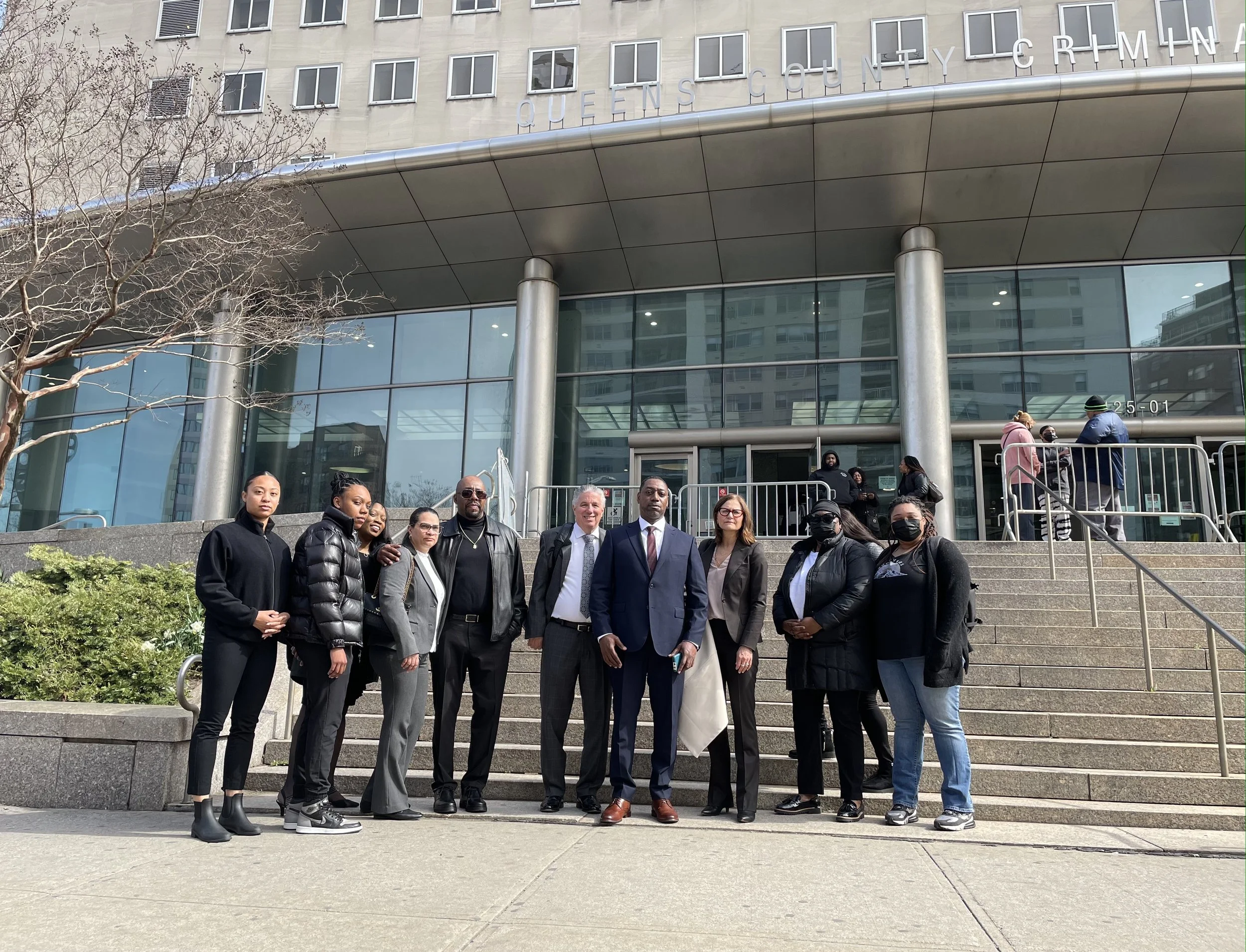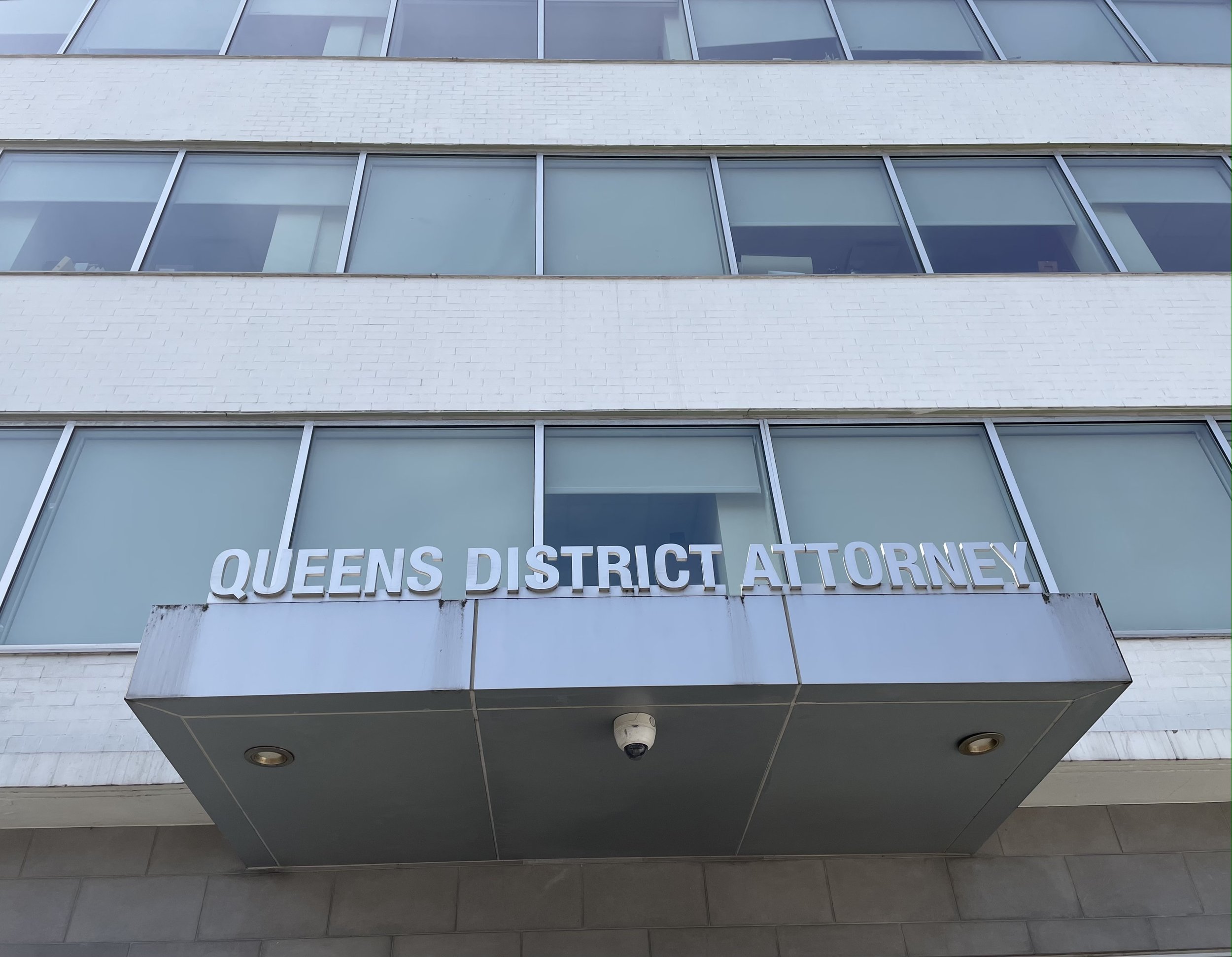Queens DA delays decision to retry wrongly convicted Queens man or dismiss case
/Michael Robinson (fourth from right) had his 30-year-old murder conviction overturned by an appellate court last month. The Queens district attorney’s office was supposed to decide by Tuesday whether or not they were going to appeal the decision, retry Robinson or dismiss the charges. They made no decision and the case was adjourned until June. Eagle photo by Jacob KayE
By Jacob Kaye
After spending three decades attempting to prove his innocence, Michael Robinson will have to wait at least another two months to potentially be freed of a murder he has consistently said he didn’t commit. And even then, it may not come.
Robinson, who served over a quarter of a century in prison for the murder of his estranged wife, Gwendolyn Samuels, appeared before Queens Supreme Court Justice Stephen Knopf on Tuesday, a month after a panel of Appellate Division judges overturned his 1993 conviction. In its decision, the appellate court gave the Queens district attorney’s office several options – formally dismiss the charges against Robinson, appeal the higher court’s decision or retry Robinson three decades after Sameuls’ death.
The day came on Tuesday for Queens District Attorney Melinda Katz’s office to make their decision. They said they weren’t ready and the case was adjourned until June.
Robinson, surrounded by more than a half dozen family members, showed up to the courthouse about an hour ahead of his scheduled appearance, only to learn it had been pushed back a half hour. Despite the delay, Robinson, who was released on parole in 2019 after serving a 26-year sentence, appeared upbeat prior to the court appearance. But exiting the courtroom, Robinson was quiet.
“I’m disappointed, I assume we all are, but there’s nothing we can do about that,” Robinson told the Eagle. “That was the decision made by the court, and we have to abide by that.”
Robinson’s case has landed back in Knopf’s courtroom after an appellate court ruled that newly uncovered DNA evidence in the case could have potentially changed the original jury’s verdict had it been presented to them at the time.
The DNA evidence, which Robinson spent years attempting to locate himself, purports to show that it was 78 trillion times more likely that someone other than Robinson stabbed Samuels to death inside a Bayside home three decades ago.
The appellate judges also cited in their decision what they believe to be inconsistent testimony from Alveina Marchon, an elderly woman who employed Samuels as a home health aide and the original prosecutors’ sole witness in the case. Marchon’s testimony often contradicted itself, the ruling said. Several years later, she’d be found legally blind.
Despite the appellate court’s overturning of Robinson’s conviction, the Queens district attorney’s office does not yet appear convinced of any faults in the Springfield Gardens man’s 1993 conviction.
Prosecutors William Branigan and John Kosinski said little during Tuesday’s appearance and had previously communicated to the court that they needed more time to decide whether to appeal the decision, retry Robinson or dismiss the charges.
“[The DA’s office] is still taking the position that [the DNA evidence] wouldn't have made a difference, even though the Appellate Division disagreed with the position they're taken,” said Harold Ferguson, a staff attorney with the Criminal Appeals Bureau at The Legal Aid Society who represented Robinson during his appeal.
“I think it would be incredibly difficult for them to retry this case because it's 30 years after the fact,” Ferguson added. “Our hope is that they will eventually come to that reality and agree to dismiss the case.”
The attorney added that he believes the DA’s office would have difficulty appealing the decision should they choose to do so.
“The Court of Appeals is a court of limited jurisdiction, it can only hear matters of law – anything that would be discretionary, they couldn't hear,” Ferguson said. “So, it would be our position that the Court of Appeals doesn't have jurisdiction over this case.”
Robinson’s niece, Tamara Robinson, said that she felt let down by the delay and was concerned for her uncle, who has been waiting for a court to recognize his innocence for decades.
“He's been waiting for a while,” she said. “It’s crazy that they're pushing it back…we should have just got an answer.”
The Queens DA’s office did not respond to request for comment on Tuesday.
The Queens district attorney’s office has yet to decide whether or not they will retry Michael Robinson, a Queens man whose 30-year-old murder conviction was overturned by the Appellate Division, Second Department last month. Eagle photo by Jacob Kaye
When Katz was running for office in 2019, the Eagle asked the then-candidate about her plans to create a Conviction Integrity Unit and how it might review Robinson’s case specifically. Robinson’s appeal of his conviction was just picking up steam at the time.
“While I cannot comment on specific cases that I'll be overseeing, cases like this are exactly why I plan to create a Conviction Integrity Unit,” Katz told the Eagle in 2019. “My first priority will be to review all the facts for cases that rely on a sole witness and make appropriate determinations based on the evidence."
Katz followed through on her promise to create the unit, which has since reviewed and submitted motions to overturn dozens of convictions. However, Robinson and Ferguson brought their case to the unit in 2020, shortly after it was created, and were denied.
Ferguson said that Bryce Benjet, the director of the CIU, told the attorney and Robinson that the case could not be reviewed by the unit because of their active motion to overturn the conviction.
“That's another sore spot here,” Ferguson told the Eagle last month. “He said…if we wanted the unit to review the case, we would have to withdraw the motion, which of course was ridiculous.”
“He knew we weren't going to do that,” Ferguson added. “So, it really wasn't a true offer.”
Their motion to dismiss the charges against Robinson came after the former corrections officer submitted a Freedom of Information Act request and received a box of documents related to the case. Among the documents was a police report that showed that fingernail scrapings and blood samples had been collected from the victim, none of which had been presented at trial.
Acting without a lawyer, Robinson sought post-conviction DNA testing on the scrapings and blood stains. A judge rejected the motion without holding a hearing.
Robinson then obtained representation from the Legal Aid Society, which successfully appealed the case to the Appellate Division, Second Department, which sent the case back to the lower Queens court “for further proceedings to ascertain whether the subject DNA evidence exists and, if it does, for forensic DNA testing of that evidence.”
Another roadblock emerged – Robinson and his attorneys were told that the evidence they were looking for no longer existed. They were told It had been lost when the building it was being held in sustained damage during Hurricane Sandy.
Following a number of hearings over the validity of the potentially damaged evidence, a judge ruled that testing could go forward.
That’s when the Queens district attorney’s office informed the court that the evidence was not in the flooded facility but was instead with the office of the chief medical examiner.
The medical examiner then tested the evidence, finding that there was male DNA in the victim’s fingernail scrape. They then tested it against Robinson’s DNA and determined that it wasn’t conclusive enough to support overturning the conviction.
Robinson and Ferguson then got Cybergenetics, a private lab, to review the evidence. Their findings were far more conclusive.
The lab determined that the DNA suggested that it was 78 trillion times more likely that Robinson was not the killer, a finding the OCME, which conducted further testing, later agreed with. But prosecutors were still not on board, and said that they believed that the male DNA didn’t necessarily come from the murderer, Ferguson said.
Knopf ruled that the new DNA evidence did not meet the criteria needed to suggest that the jury would have ruled differently if presented with the evidence, a ruling that the Appellate Division, Second Department overturned last month.
“And here we are,” Knopf said on Tuesday.
Robinson, who told the Eagle last month that he was refraining from getting too excited about the appellate ruling because of the DA’s looming decision, left the courthouse following the appearance to head back to his Springfield Gardens home with his family.
“I'm just waiting to get over this last hump,” he told the Eagle in March.
The district attorney’s office is expected to decide how they’re going to proceed in the case on June 6.





